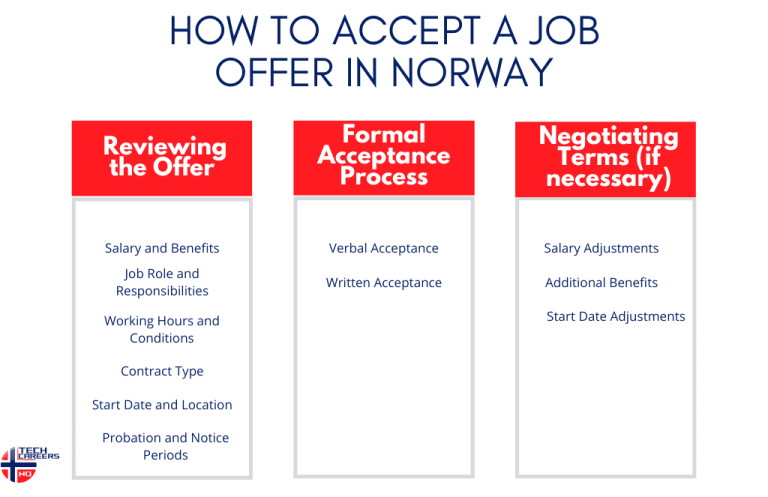
Common Formats of Job Offers in Norway
When exploring IT jobs in Norway or any other sector, it’s essential to understand the typical formats and components of job offers you might encounter. Norwegian job offers can vary depending on the company and industry, but they generally follow a standard structure. Here are the common formats of job offers in Norway:
1. Written Job Offers
Written job offers are the most formal and commonly used format in Norway. These offers are typically delivered via email or postal mail and include comprehensive details about the employment terms. Key components of a written job offer include:
- Job Title and Description: Clearly outlines the position and responsibilities.
- Salary and Benefits: Specifies the base salary, bonuses, health insurance, pension plans, and other benefits.
- Start Date: Indicates when the employment is expected to commence.
- Working Hours: Details the expected working hours per week, including any flexibility.
- Contract Type: Specifies whether the position is permanent, temporary, full-time, or part-time.
- Probation Period: Includes the duration of any probationary period and associated terms.
- Termination Notice: Outlines the notice period required for terminating the employment contract from either side.
2. Verbal Job Offers
While less formal, verbal job offers are also common in Norway, especially in the initial stages of recruitment. These offers are usually made over the phone or during an in-person meeting. Although a verbal offer can provide a quick way to gauge a candidate’s interest, it is typically followed by a written offer to formalize the terms.
3. Email Job Offers
Email job offers are a hybrid between written and verbal offers, providing the formality of a written offer with the convenience of electronic communication. These offers include all the necessary details and are often used to expedite the hiring process. Candidates should always respond to email offers promptly, whether to accept or reject job offer after signing contract.
4. Job Offer Letters with Contract Attachments
In some cases, employers in Norway may send a job offer letter that includes the employment contract as an attachment. This format allows candidates to review all terms and conditions in detail before making a decision. The offer letter itself typically summarizes key points, while the contract provides an in-depth look at the employment terms.
Understanding these common formats will help you navigate job offers in Norway more effectively, ensuring you make informed decisions about your career.

How to Accept a Job Offer in Norway
Accepting a job offer in Norway involves several key steps to ensure that you start your new position on the right foot. Whether you receive an official job offer letter or an email, handling the acceptance process professionally is crucial. Here’s a step-by-step guide on how to accept a job offer in Norway:
1. Reviewing the Offer
Before you accept a job offer, it’s essential to thoroughly review the terms and conditions presented in the official job offer letter or email. Consider the following aspects:
- Salary and Benefits: Ensure the salary meets your expectations and that the benefits package is competitive.
- Job Role and Responsibilities: Verify that the job description aligns with your career goals and skills.
- Working Hours and Conditions: Check the working hours, including any flexibility or remote work options.
- Contract Type: Understand whether the position is permanent, temporary, full-time, or part-time.
- Start Date and Location: Confirm the proposed start date and the work location.
- Probation and Notice Periods: Review any probation period details and the required notice period for termination.
2. Formal Acceptance Process
Once you have reviewed the offer and decided to accept it, you need to follow a formal acceptance process.
Verbal Acceptance
If you receive a verbal offer, it’s courteous to express your enthusiasm and gratitude verbally before following up with a written confirmation. A simple phone call or an in-person conversation can suffice.
Written Acceptance
For written acceptance, you typically respond via email or letter. Here’s how to reply to a job offer email or letter formally:
Formal Acceptance
Subject: Acceptance of Job Offer – [Your Name]
Dear [Hiring Manager’s Name],
I am delighted to accept the offer for the position of [Job Title] at [Company Name]. I have reviewed the terms and conditions outlined in the official job offer letter and am excited to join the team.
Please consider this email as my formal acceptance. I look forward to starting on [Start Date] and contributing to the success of [Company Name]. If there are any further steps I need to complete, please let me know.
Thank you once again for this opportunity.
Best regards,
[Your Full Name]
[Your Contact Information]
Informal Acceptance
Subject: Excited to Join the Team!
Hi [Hiring Manager’s Name],
Thank you for the job offer for the [Job Title] position at [Company Name]. I’m thrilled to accept and can’t wait to get started on [Start Date].
Looking forward to working with everyone!
Best,
[Your Name]
3. Negotiating Terms (if necessary)
If you need to negotiate any terms of the offer, approach it respectfully and professionally. Commonly negotiated aspects include:
- Salary Adjustments: If the offered salary is lower than your expectations, provide a well-reasoned counteroffer.
- Additional Benefits: You might negotiate for extra vacation days, remote work options, or professional development opportunities.
- Start Date Adjustments: If the proposed start date is too soon or conflicts with your current commitments, request a revised start date.
Here’s an example of how to frame a negotiation email:
Subject: Discussion on Job Offer – [Your Name]
Dear [Hiring Manager’s Name],
Thank you for offering me the [Job Title] position at [Company Name]. I am very excited about the opportunity and eager to join the team.
After reviewing the offer details, I would like to discuss the salary component. Given my experience and the industry standards, I was hoping we could explore the possibility of adjusting the salary to [Proposed Salary]. Additionally, I would like to discuss the possibility of an additional week of vacation.
I am confident that we can reach an agreement that works for both of us. Thank you for considering my request. I look forward to your response.
Best regards,
[Your Full Name]
[Your Contact Information]
Accepting a job offer in Norway involves careful review, clear communication, and, if necessary, polite negotiation. By following these steps, you can ensure that you begin your new role with a clear understanding and a positive relationship with your new employer.

How to Reject a Job Offer in Norway
How to Decline a Job Offer Due to Salary
Declining a job offer due to salary can be a delicate process, but it’s important to handle it professionally to maintain a positive relationship with the employer. Here are the steps to follow when you need to decline a job offer due to salary:
1. Be Prompt and Courteous
Responding to the job offer promptly shows respect for the employer’s time and allows them to move forward with other candidates. A courteous tone will help maintain a positive impression.
2. Express Gratitude
Start your communication by thanking the employer for the opportunity. This acknowledges the time and effort they invested in the recruitment process.
3. Be Honest but Tactful
Clearly state that the reason for declining the offer is the salary. Being honest helps the employer understand your decision, but it’s important to be tactful to avoid sounding negative or ungrateful.
4. Keep the Door Open
If you are genuinely interested in the company but unable to accept the offer due to salary, express your interest in future opportunities. This keeps the door open for potential future positions that may better meet your salary expectations.
Example:
Subject: Job Offer for [Job Title] – [Your Name]
Dear [Hiring Manager’s Name],
I would like to extend my sincere gratitude for offering me the position of [Job Title] at [Company Name]. I am truly honored and appreciate the confidence you have shown in my abilities.
After careful consideration, I regret to inform you that I must decline the job offer. The salary offered does not meet my financial requirements at this time. This decision was not easy, as I am very impressed with [Company Name] and the team.
I hope we can stay in touch, as I remain very interested in [Company Name] and would love to be considered for any future opportunities that may align more closely with my salary expectations.
Thank you once again for the opportunity. I wish you and the team continued success.
Best regards,
[Your Full Name]
[Your Contact Information]
How to Reject a Job Offer Politely via Email
Rejecting a job offer, particularly for expat jobs in Norway, can be a challenging task. However, doing so politely and professionally can leave a lasting positive impression. Here’s a detailed guide on how to craft a courteous rejection email:
1. Respond Promptly
Timeliness is crucial when rejecting a job offer. Responding quickly, ideally within a few days of receiving the offer, shows respect for the employer’s time and helps them move forward with their recruitment process.
2. Show Gratitude
Start your email by expressing gratitude for the opportunity. Acknowledge the effort the employer has put into the hiring process and show appreciation for being considered.
3. Provide a Clear and Concise Decision
State your decision to decline the job offer clearly and respectfully. There is no need to go into extensive detail about your reasons unless you feel it would be beneficial.
4. Offer to Stay in Touch
If you are genuinely interested in the company and would like to be considered for future opportunities, mention this in your email. This keeps the door open for potential future engagements.
Example:
Subject: Thank You for the Job Offer – [Your Name]
Dear [Hiring Manager’s Name],
I hope this email finds you well. Thank you very much for offering me the position of [Job Title] at [Company Name]. I am truly honored and grateful for the opportunity to join your esteemed team.
After careful consideration, I have decided to decline the job offer. This was not an easy decision, as I have been thoroughly impressed by [Company Name]’s vision and the potential role within your team. However, I have concluded that the position does not align as closely with my career goals and personal aspirations at this time.
I genuinely appreciate the time and effort you and your team have invested in the recruitment process. I have enjoyed learning more about your company and meeting such dedicated professionals.
I hope we can stay in touch, as I have a high regard for [Company Name] and would be keen to explore potential opportunities in the future that may better align with my career path.
Thank you once again for your understanding and for considering my application.
Warm regards,
[Your Full Name]
[Your Contact Information]
[LinkedIn Profile] (optional)
By crafting a rejection email in this manner, you demonstrate professionalism and courtesy, which can be particularly important when navigating the competitive landscape of expat jobs in Norway. This approach not only leaves a positive impression but also keeps the possibility of future opportunities open.
How to Postpone a Job Offer
There are a few ways to postpone a job offer politely and professionally. Here are some tips:
Be Honest and Upfront:
- Explain your situation. If you’re waiting to hear back from another company, considering relocation options, or have a personal situation requiring attention, let them know.
- Be clear that you’re interested in the position but need more time to make an informed decision.
Be Respectful of Their Time:
- Even if you don’t have a specific reason for the delay, acknowledge the offer and their time invested in the interview process.
- Give a specific timeframe for your response. A few days is generally reasonable, but be flexible if they have a pressing deadline.
Here are some phrases you can use:
- “Thank you so much for the offer! I’m truly impressed with the company and the role. I would be grateful if I could have an additional [number] days to carefully consider the offer.”
- “I’m currently finalizing the interview process with another company. I’m very interested in this opportunity as well, and would appreciate it if I could get back to you by [date].”
Additional Tips:
- You can request a written copy of the offer to “review the details thoroughly” before making a decision. This can buy you some extra time.
- Be prepared to answer questions about your timeline. Be honest but avoid going into unnecessary details about other opportunities.
- Remember, even if you decide to decline the offer later, be courteous and express your appreciation for their time and consideration.
By following these tips, you can postpone a job offer in a way that is professional and respectful of the employer’s time.
FAQ
In Norway, employers typically expect a response to a job offer within one to two weeks. This allows candidates enough time to consider the offer thoroughly while still keeping the hiring process moving. However, the exact timeframe can vary depending on the company and the urgency of filling the position. If you need more time, it’s best to communicate this as soon as possible.
Yes, it is perfectly acceptable to ask for more time to consider a job offer in Norway. When making this request, be polite and provide a clear reason for needing additional time, such as considering other offers or discussing the decision with family. Specify the amount of extra time you need, and ensure it is a reasonable period, typically no more than a week or two.
Yes, a company can retract a job offer. This can happen for various reasons, such as changes in the company’s financial situation, internal restructuring, or new information about the candidate. While it is not a common occurrence, it underscores the importance of receiving and reviewing a written job offer in Norway to ensure all terms are clearly outlined and understood.
If you change your mind after accepting or rejecting a job offer, it’s important to communicate this as soon as possible. If you have accepted a job offer but wish to decline it later, contact the employer immediately and explain your reasons honestly and respectfully. Similarly, if you have rejected an offer but are reconsidering, reach out to the employer to see if the position is still available. Be prepared for the possibility that the employer may have already moved on to other candidates.
In Norway, the job offer process is generally straightforward, but there are some cultural nuances to keep in mind. Norwegians value directness and honesty, so it’s important to be clear and sincere in your communications. When accepting a job offer, show your enthusiasm and commitment. If rejecting an offer, do so politely and express your gratitude for the opportunity. Maintaining professionalism and respect throughout the process is key in the Norwegian job market.
Let’s Navigate Your Job Offer in Norway with Ease!
Taking the next step in your career in Norway requires confidence and the right approach. Whether you need to accept, reject, or negotiate a job offer, our detailed guide has you covered with practical examples and expert tips.


 Previous Post
Previous Post Next Post
Next Post